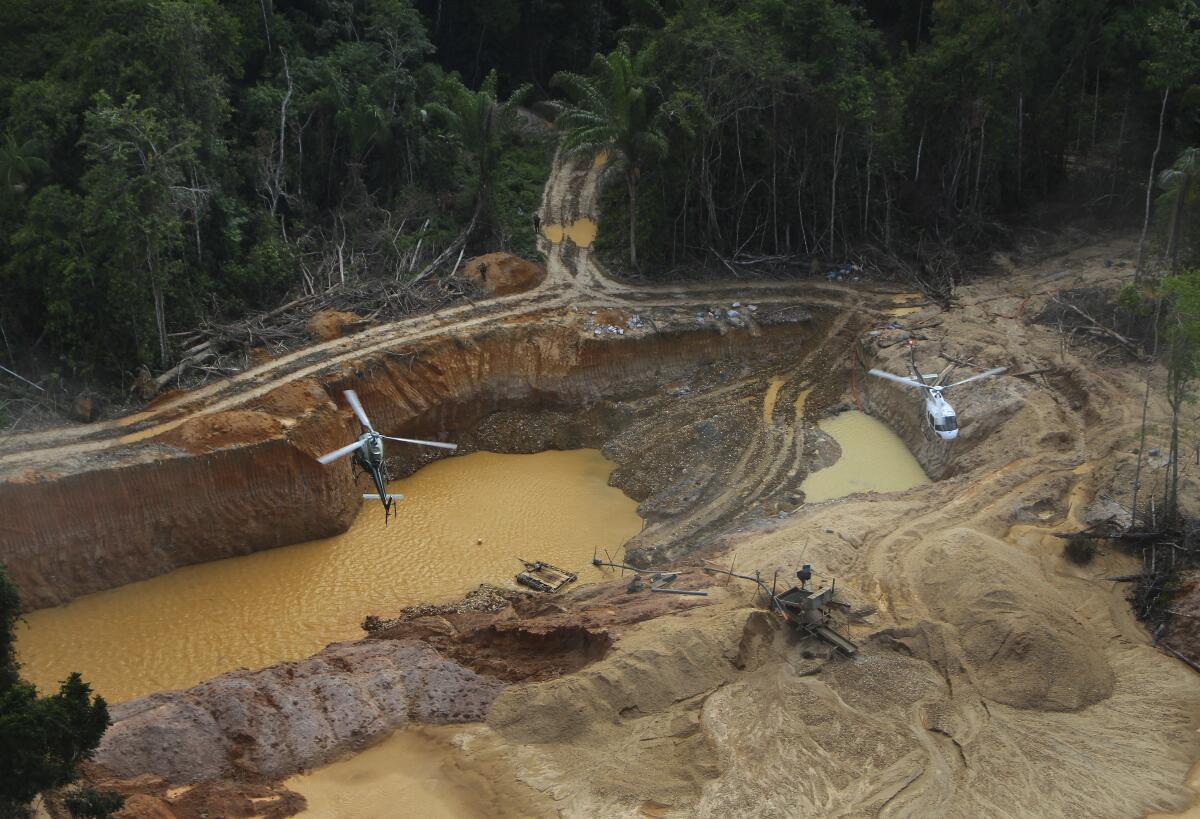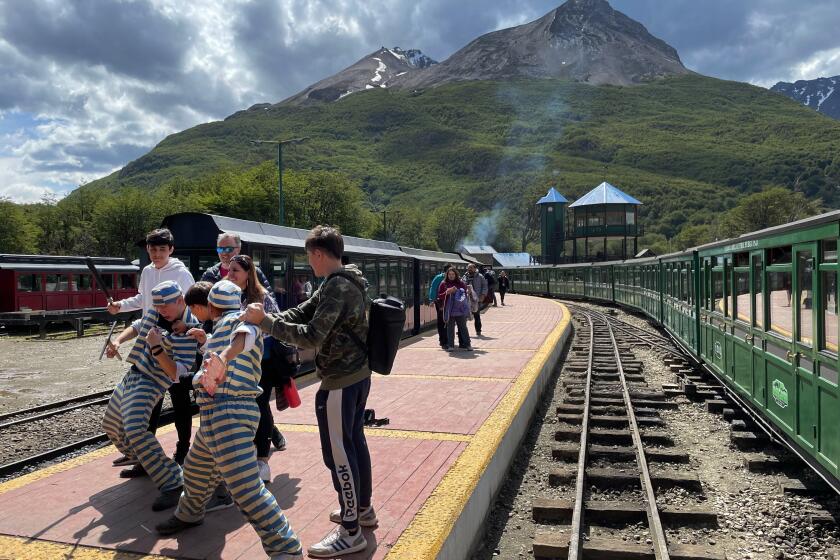Rio’s Carnival parade makes urgent plea to stop illegal mining in Indigenous lands

- Share via
RIO DE JANEIRO — Carnival dancers took the biggest stage in Rio de Janeiro with their faces painted red in a traditional Indigenous manner while percussionists had “Miners out” written across the skins of their drums.
It was part of the samba school Salgueiro’s tribute to the Yanomami, Brazil’s largest Indigenous group, with its giant floats, costumes and songs based on the group’s ancient culture and traditions.
“My Salgueiro is the arrow for the people of the forest,” the parade participants sang out as they marched through the arena known as the Sambadrome, delivering their message to more than 70,000 revelers at the venue and millions watching live on television into early Monday. “The chance that’s left for us is an Indigenous Brazil.”

President Luiz Inácio Lula da Silva is under pressure to deliver on promises to eradicate illegal mining, particularly amid a recent backslide in efforts. The parade at the Sambadrome came as Brazil celebrated one year since Lula declared a public health emergency for the Yanomami people in the Amazon, who are suffering from malnutrition and diseases such as malaria as a consequence of illegal mining.
“Ours is a cry for help from Brazil and the world in general,” said Davi Kopenawa, a Yanomami leader and shaman who advised the samba school on how to remain truthful to his people, and paraded with Salgueiro. “My hope is that the world, upon hearing our call, will put pressure on the Brazilian government to remove all the miners, destroyers of our Mother Earth, who are soiling the water and killing fish.”
Kopenawa paraded with feathered armbands and headdress, plus a beaded necklace depicting a jaguar. He was joined by 13 other Yanomami who flew across the country to participate in Salgueiro’s parade. One of the first floats consisted of a severed tree trunk, with a performer depicting a Yanomami mother seeking to protect her child as invaders drew close. Other floats featured massive sculptures of Yanomami people.
Through this homage to Yanomami history and culture, Salgueiro sought to draw attention to the devastating effects brought by illegal mining inside Yanomami territory, including widespread river contamination, famine and disease.
At the southernmost tip of Argentina’s Patagonia sits ‘the prison of the end of the world.’ The country banished prisoners here in the early 1900s to colonize the region.
Some 30,000 Yanomami live in Brazil’s largest Indigenous territory, spanning more than 22 million acres in the northern area of the Amazon rain forest along the border with Venezuela.
Three weeks after assuming the presidency, Lula declared a public health emergency and sent in the armed forces, doctors, nurses and food. Still, more than 300 Yanomami died of various causes in 2023, according to the Health Ministry.
Lula swiftly created a dedicated inter-ministerial task force to fight illegal mining, and in 2023, Brazil’s environmental agency destroyed a record 33 aircraft found on or near Yanomami territory. The agents also wrecked or apprehended mining barges, fuel, chain saws, Starlink internet units and campsites.
Government officials say that since the beginning of the operation, areas with illegal mining inside Yanomami territory have dropped 85% and that the health of the Yanomami has improved.
But after the operation’s initial success, prosecutors, law enforcement and employees of federal environmental agencies say illegal miners are returning.
“There has been a significant reduction, but mining hasn’t ended. We reckon that the miners are exploiting as much as possible, because they assess they eventually will have to leave,” Jair Schmitt, head of environmental protection at Brazil’s environmental agency Ibama, told the Associated Press.
He said miners have adapted to escape law enforcement and satellite detection by working at night, setting camp under the forest canopy and choosing old mining pits instead of clearing forest to open new ones.
Humberto Freire, director of the newly created Amazon and environmental unit of the federal police, said officers also noticed miners have begun working in a much smaller, artisanal way, and that government agencies need to take stronger action.
“We need, for example, the air force to effectively control the airspace over Yanomami land. We need the navy to control the flow of people on rivers. We need the army to do a quality job, too,” Freire said. “The federal police can do more, the armed forces can do more, as well as Ibama and Funai” — the Indigenous affairs agency, he said.

One of the parade’s wings featured dancers dressed in the dark-green garb of army uniforms. Following behind was a float featuring two giant army hats with skulls, an explicitly critical element of the parade.
Lula had said the armed forces would play a key role in the fight, providing logistical support and security to public workers and federal agents on the ground who say they increasingly fear for their lives.
But it isn’t the military’s responsibility to engage in direct combat, according to political scientist João Roberto Martins Filho. Still, the big question is why the army, which has three permanent bases inside Yanomami territory, didn’t sound the alarm under Lula’s predecessor, Jair Bolsonaro.
“There was nearly a massacre of an unprotected population. Why did the army let this happen instead of denouncing it to the federal government or reaching out to the press?” Martins Filho, a professor at the Federal University of Sao Carlos, told the AP. “In a certain way, they were accomplices.”
In a written response to the AP, the army said that illegal mining and the health crisis within the Yanomami territory “are complex issues involving the legal jurisdiction of various government agencies” and that the army is “always prepared to fulfill its strategic missions.” That includes providing support to federal agencies through logistical, communication and intelligence activities, such as those being conducted in the Yanomami territory, the statement said.
Illegal planes are essential for transporting prospectors and equipment to far-flung reserves, as shown in a 2022 Associated Press investigation in Roraima state, where most mining affecting the Yanomami takes place. Without unauthorized aircraft, officials and experts have said, illegal mining operations would collapse.
After a January 2023 presidential decree ordered the air force to close the airspace over Yanomami territory, the situation improved significantly, authorities and Indigenous people told the AP.
In a written response to the AP, Brazil’s air force said it has been patrolling the so-called Air Defense Identification Zone over the Yanomami territory. Under this rule, an aircraft may be shot down for failing to obey orders to change route. The force claims the measure led to a 90% reduction in illegal flights.
“It’s highly efficient. We would find landing strips, but no planes,” said André Luiz Porreca Ferreira Cunha, a federal prosecutor who oversees cases linked to illegal mining across the western Amazon.
But some on the ground suggest the armed forces are no longer sufficiently involved in operations, and that illegal miners started coming back as a result.
In a joint statement last month, the associations representing federal workers in environmental and Indigenous affairs accused the armed forces of “failing to fulfill their mission of supporting and facilitating the work of other agencies” combating illegal mining. The association alleged that the military denied use of aircraft for transporting personnel and equipment, haven’t collaborated in the destruction of mining machinery and airstrips and instead shut down support points for refueling environmental agency aircraft.
Ferreira Cunha, the prosecutor, said violent attacks on Ibama agents and members of the federal police are becoming more frequent, with some cases of attempted murder. Government health teams have also been targeted, and are unable — or unwilling — to reach certain communities, said Júnior Hekurari, a member of the group and president of Condisi-Y, the local health council.
“Some are heavily armed; the health teams are scared,” he said.
“This state of emergency cannot solve the problem. We need something permanent, for all the communities,” Hekurari added. “If they [government authorities] don’t stay, the miners will return tomorrow.”
More to Read
Sign up for Essential California
The most important California stories and recommendations in your inbox every morning.
You may occasionally receive promotional content from the Los Angeles Times.










